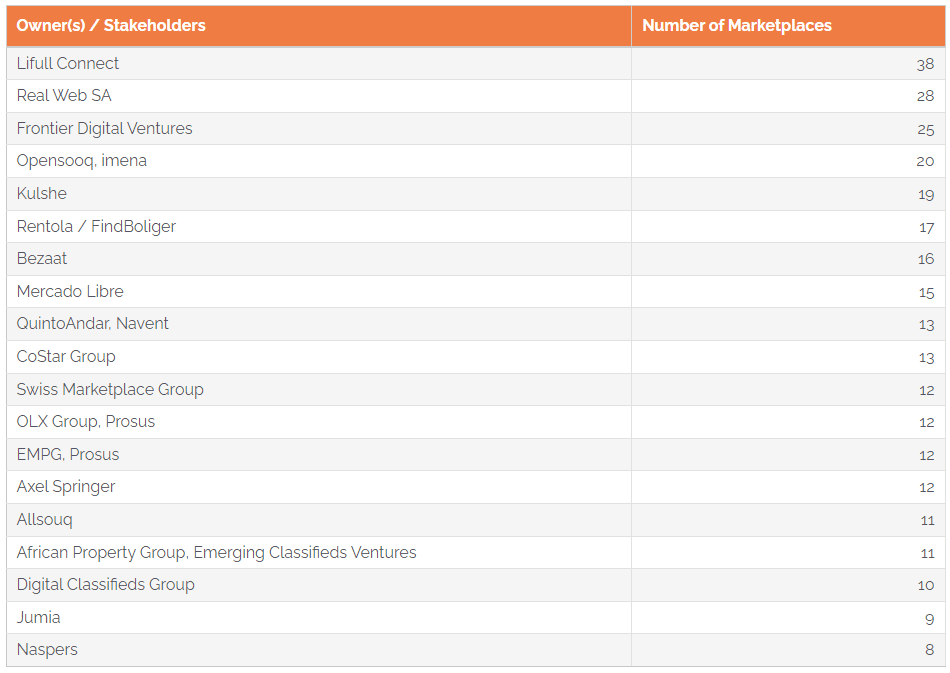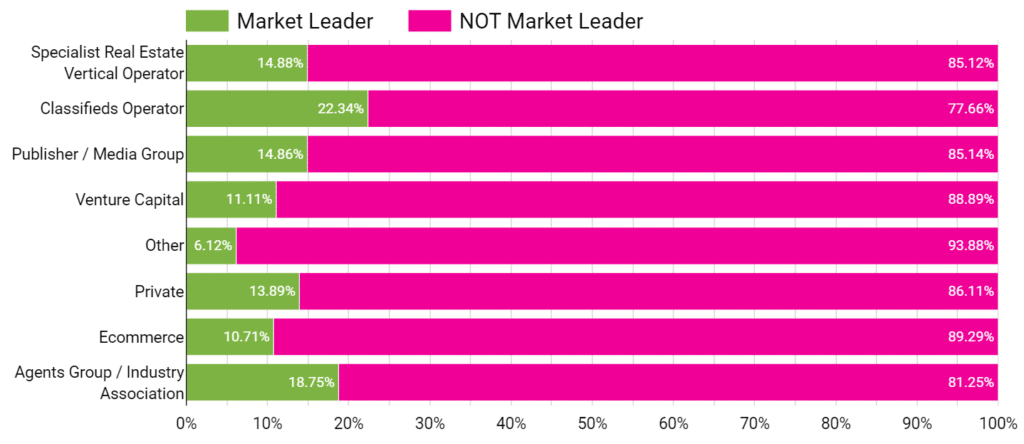
Since the beginning of 2020, we have covered over 175 mergers and acquisitions in the real estate marketplace sector. We've also been building data on the 900 or so active real estate marketplaces worldwide—and who owns them.
Over the course of March and April 2023, we put together a free report (linked below) showing how many of them are owned by the same companies and how the profile of owners differs across different markets and regions. We also analysed whether real estate marketplaces owned by one type of company tend to be more successful than those owned by other types.
Below: Industry veteran and former REA Group CEO, Simon Baker discusses the results of the report with the author.
The following is only a summary of the Online Marketplaces Real Estate Portal Ownership Report; we highly recommend viewing the full report. If you're subscribed to our mailing list, a link to the report is already in your inbox.
We knew that real estate marketplaces are owned by a variety of different types of companies but we wanted to classify them. Our theory was that most would be owned privately (in small or developing markets) or by specialist companies that only operate real estate verticals.
What we found was that although specialist companies represent the most common type of owner for these businesses, many are still owned by the general classifieds players and legacy media companies that bought or developed them when real estate first went online.
Former REA Group CEO, Simon Baker believes that the split of the type of companies that own real estate marketplaces won't necessarily change or trend towards specialization.
"I don't actually see that really changing except that as marketplaces in various countries become more profitable and prove out their model you're going to see more of the rich coming in and buying them and thus growing them."
Agent groups and industry associations make up a very small portion of real estate marketplace owners and stakeholders. Baker did agree that agents groups "missed the boat" twenty years ago when they had the chance to be major stakeholders in real estate marketplaces.
"They all had the chance to participate. I think they either didn't understand. Or when they did put it together they put it together more as a club rather than as a fully operating business and they sacrificed what you needed to do which was put together serious money to build a brand."
There are a few companies out there that seem to have been on a shopping spree for the last few years. We found that Japanese real estate portal operator Lifull, which recently added Mexican portal Lamudi to its portfolio, is the company that owns the most real estate marketplaces globally.

There is a wide variety of companies out there that own real estate marketplaces. Although over a third of all real estate marketplaces worldwide are owned by just 20 companies, we found that there are still many that are just small, one-country operations.
As Baker pointed out, it seems that most of the players that own many real estate marketplaces do so in developing countries.
"The interesting thing here is to see which are operating in mature and developing markets. As you go down the list you get more mature.
The reason you have a high number of players at the top of the graph is that you have a high number of small revenue players. You're trying to roll consistent models across there and operate multi-market off one platform and run it as an EBITDA profitable business."
Contrary to our assumption, it seems that there isn't a huge correlation between the type of company that owns a marketplace and whether it's the leader in its market.
We had thought that those owned by specialist real estate portal operating companies would have the highest incidence of market leadership but in fact, portals owned by general online classifieds operators are the most likely to be market leaders. This is especially true in developing markets around the world where more marketplaces are owned by companies that don't specialise in real estate.

The question of whether real estate portal companies in emerging markets need some kind of outside investment to become market leaders was brought up at the recent Property Portal Watch conference in Bangkok. We were able to plug that dimension into the mix in the report as well.
We found that in developing markets, foreign ownership was much more common and those marketpalces with foreign owners were even more likely to be leaders in their respective countries.
For Baker, the discrepancy is explained by market leaders attracting foreign investment rather than foreign capital necessarily creating leaders.
"If you're a market leader that's going to be acquired, there's a very good chance that a foreigner will come in and buy your business because they are the ones with the money to spend on it. If you're not a market leader it's going to be very hard to get foreigners to buy you."

Sign up for our mailing list for our renowned weekly newsletter to access the full report and see more data about real estate marketplace ownership. If you're already subscribed to the Online Marketplaces' weekly newsletter, a link to the report will already be in your inbox.